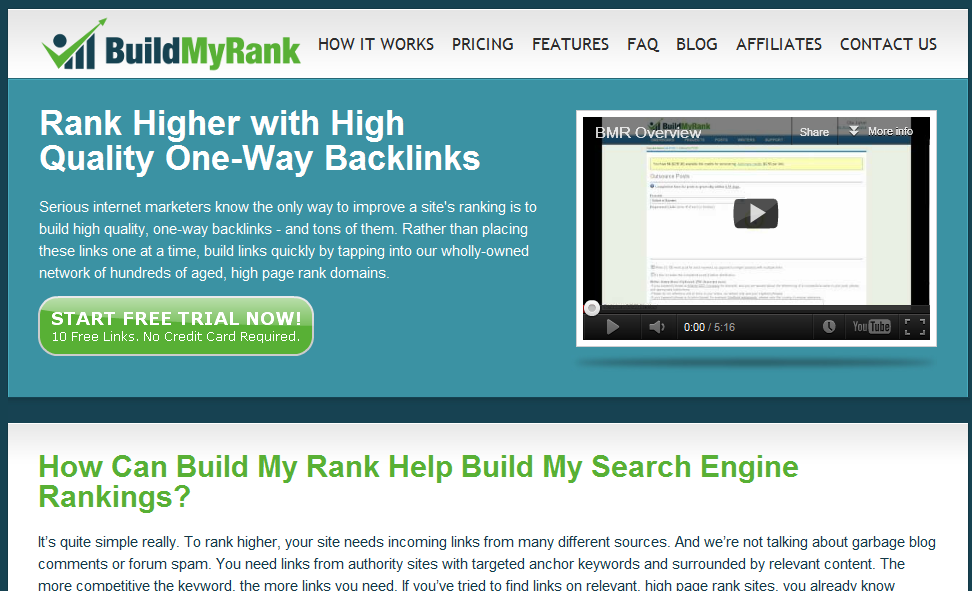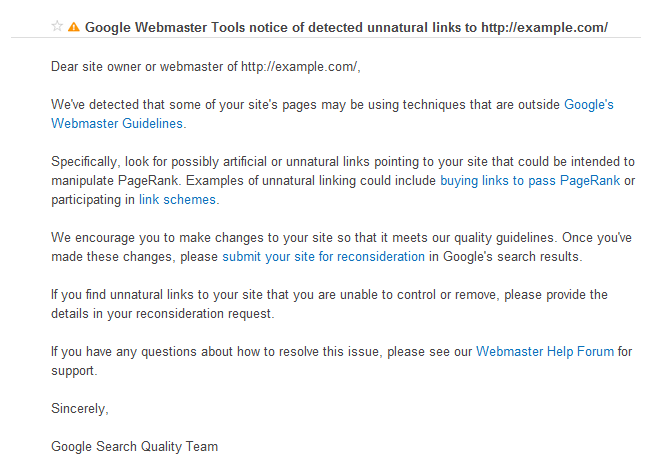When SEO companies go bad!
After you have read this post please share it with anyone who currently employs a company to do search engine optimisation for their business website. What is outlined in this post could have a major negative impact on the future of their website and their online business prospects. You can also share on Twitter, Facebook, Google+ and LinkedIn using the buttons at the top. Here we go…
Something big has happened at Google… really big!
And so far the new Google initiative has mostly gone under the radar (note I said “So far” )
But this will change very quickly once businesses realise that:
- the phone is not ringing as often this week compared to last week
- or maybe the email volume from the Contact Page seems a little more manageable
- or sales seem to be down this week
- or any of the other conversion targets your business has for the company website don’t seem to be firing the way they were
Sure, there are seasonal fluctuations, there are even weekly and daily fluctuations which seem sometimes to have no logical cause.
But, this is a bit different!
What has happened that could cause such a sudden drop in traffic and sales?
The major international SEO blogs have been abuzz with this latest initiative for a week or more now.
And it is looking like it cuts a bit closer to home and has more serious consequences than Google’s now infamous Panda Update!
What is Google up to and how does this affect business SEO?
Google signaled quite clearly at the recent SXSW (Annual music, film, and interactive conference in Austin, Texas) that it intended to level the SEO playing field a bit…
No, actually, a lot!
Matt Cutts, head of Google’s Webspam team broke the usual Google information norm by pre-announcing a strategy to improve search results – making sites with quality content and reputation (mom and pop sites) rank against the big sites with massive SEO budgets.
He was reasonably oblique with his ” How” (surprise!) so there was a flurry of speculation and a number of top SEO bloggers offered advice on toning down keyword density, further variations to anchor text, relaxing title tag/ H1/ description/ alt tags to make SEO appear “more natural”.
If you are not an SEO obsessive, here is a simplified version – Matt Cutts said – If we detect that you are pushing the envelope by doing too much SEO you will be penalised – so everyone went into pre-emptive damage control!
Interestingly, I think Matt Cutts trumped everyone!
While the scurry was happening Google quietly took down and de-indexed the biggest paid blog network on the Internet.
Paid blog networks to build links are history!
“Build My Rank” was probably the biggie of blog networks.
Results from using this network were fairly spectacular – reviews which I won’t reference here documented huge sales growth for affiliate marketers – just 50 posts on this network across PageRank blogs of only 2-4 seemed to get amazing results!
And the somewhat surprising factor was that this site really didn’t go too hard down the “black hat” line. The posts had to be human approved, no duplication and spun articles were often rejected outright.
This was a site that even the owners thought was “compliant enough”!
Kudos to these guys – once they were hit with de-indexing they immediately offered refunds to all members and they also offered an easy solution to remove all of the offending links from their members’ sites.
For the people who received a message via Webmaster Tools telling them that an unnatural link profile had been detected this is probably too little, too late.
If you ever get the following message be very afraid!
Does your provider give you access to your Webmaster Tools information? If not, ask why!
If you are unfamiliar with what it takes to be reconsidered for indexing in Google, be sure this is not an easy process.
First you need a full link analysis. Then you need to approach every one of the undesirables linking to you (and they will usually not be reachable), or you need to remove duplication or code issues, or you need to remove anything else that violates the guidelines…
One mid-level SEO in the US charges $10,000 per month to clear a site of non-compliance penalties and get the site re-indexed! Got a spare USD$60,000 to invest?
If you are doing this yourself first you have to ensure your site is completely Google compliant, then you ask to “please” be reconsidered – think about this process as being 3 – 6 months.
Sound easy? No, of course not!
And this is the thin end of the wedge…
It is becoming obvious that Google has dug a lot deeper with a large number of blog networks being taken down.
How does this impact on New Zealand SEO?
It looks like Google has really embarked on this campaign with a take no prisoners mindset.
I have personally seen New Zealand SEO and web marketing companies drop from the top few positions to page 3 or into oblivion in the last few days. These are businesses which have held fast to the top spots in many cases for at least the last 12 months.
Gone Baby Gone…
The scary thing is that their clients’ sites have had the same treatment. Those clients who actually monitor their search engine placings will already be asking “Where the hell has my site gone?”.
The answer of course is in this dismantling of non compliant paid blog networks!
Build My Rank is an example a blog network, a privately owned network of blogs which houses a large amount of content and which builds PageRank for each site in the network based on unique content and visitors.
Having links within the content on these sites is an attractive way to gain links for a subscriber which appear to be genuine and natural.
To build a network like this takes time, investment and a large number of participating content suppliers to build up Page authority.
This tweet from Rand Fishkin shows the breadth of the Google initiative: (click the link in the tweet to see what he is referencing)
Getting more emails and seeing more threads about Google webspam striking additional blog networks after BMR
— Rand Fishkin (@randfish) March 24, 2012
Are these people nuts?
I’m no black hat expert, but common sense tells me that google.com/search?q=build… is a combination of ironic and foolhardy
— Rand Fishkin (@randfish) March 27, 2012
If you build 500 blogs on WordPress and you buy 500 domain names at $10 apiece per annum, then you host the sites through a large provider (varies in price but you need to find a provider that is of the “no see/no hear/no speak” variety), and then you need the software development, the coders, the marketers and the management to maintain the network.
Big bucks!
It is much easier to subscribe and pay the 60-400 dollars a month to have instant access to a simple, link producing machine.
How prevalent are these non-compliant SEO strategies in New Zealand?
Let’s look at the level of paid blog network use by some of our local search engine optimisation providers…
And I am talking about some extremely prominent SEO companies here.
One New Zealand company offers (or offered, I hope) an article which is put through an article spinner (ie unreadable rubbish) and submitted to their own private (maybe not so private) network of WordPress blogs – 400 in total.
Article spinning? Check this out:
Carson Ward wrote this great post at SEOmoz This is a great example of a title on a blog network “Choosing Tragedy Cleanup Sodium Body Of Water Town UT”.
Did anyone guess that Sodium Body Of Water Town is a spun version of Salt Lake City?
Anyway, 200 links from one of these networks is usually enough to gain front page top positions for a Kiwi business for their keyword. (in a non-competitive niche it probably is)
And this example of SEO spam is not a lone wolf – several big firms will be looking very closely at their clients’ Webmaster Tools notifications and they will be working out how to deal with monthly client reports… (sorry, no data? a glitch in the system? Yeah, Right!)
We are not talking about moderated blog networks or anything approaching compliance here. We are talking about webspam pure and simple. And this is fairly prevalent in New Zealand as an SEO solution…
After all:
- Who wants to spend hours building social media connections?
- Who wants to reach out to influential bloggers and build relationships with them?
- Who wants to create high quality articles and jump through the hoops to get unique content published on the most fussy sites in the world?
- Who wants to apply to be considered by the most important global business listings?
- Who has the time to build a following on social bookmarking and web 2.0 platforms?
- Who has a business that would be considered as worthy of listing by a .govt or .edu site?
- And last of all, who has the time to monitor every single daily change that Google makes to it’s algorithm?
So the easy answer is to utilise:
leverage…
automation…
outsourcing…
black hat SEO…
But there are huge risks with taking this approach as we have seen.
Plunging from the top Google spots to the outer reaches of the universe is one.
One day you are making sales, the next day the sales have stopped abruptly… gone… finished!
And believe me this is happening right here, right now!
Google has also hit another common SEO hack
Now for the second Google slam-dunk!
The second big webspam problem Google has been targeting is what they refer to as an “unusual link profile”.
This may be all of your links from one particular link technique:
Are all of your links from blog comments? (indicating automated comment spam)
Or are they from low quality directories? (outsourcing to third world providers who hammer PageRank 0-2 easy listings)
Are they from paid link sources? (have you ever been offered 100’s of links for $49.95 – yes we have too!)
Or perhaps from blog networks (as above)
Or maybe your web developer is screwing you without you knowing it!
More dubious link techniques – this time from developers!
Here is a case of a large New Zealand/Australian web development company breaking all the rules.
A friend who runs a web design, conversion optimisation, SEO and PPC business called me this week to clarify a situation she was having a bit of a problem with.
A client had suddenly plunged out of the Google New Zealand search results. They wanted to know what was going on so they rang my friend and asked the big question.
This led to major analysis of the site and what was found was more than 500 hot links from the site all leading to the web developer’s other current clients…
Wow!
Would you be pissed?
A phone call to the web company who built the site got the response:
“Hey, what’s your problem? This helps the site do better in Google”.
Really?
As part of the recent algorithm update, sites that have an unnatural link profile will be penalised, and this is serious!
I checked out the web development company’s link stats and the tools I use showed more then 500,000 links pointing at their site.(500,000? For a local web supplier?… Come on!)
Yet, when I used their premier home page title tag keyword in search they did not figure in the first three pages of Google! (or even in the top 100 spots according to my friend’s research!)
Check out the link stats below… (most sites would be in the 300-3000 range)
528,441 links? They should be outranking Coca Cola! And should be nudging Wikipedia and maybe giving Lady Gaga a bit of grief!
I suggested that the company in question would probably be less concerned about one client’s change in fortunes than about the complete destruction of their brand through being totally busted for using black hat SEO.
The bummer is that in each of the cases above it is the clients of these companies who will suffer the most.
A company takes years to build a reputation and a following for their brand, both online and offline and to have this destroyed by cowboys looking for a way around the time consuming reality of ethical search engine optimisation is disturbing.
And they will have been charged top dollar for these results.
This really bugs me!
Is it time for some sort of regulation in this industry?
Mind you I would be a bit worried about who did the regulating… (no comment)
As an interesting aside/postscript there was a great post recently on Search Engine Watch about this same topic. Eric Ward talks about his frustrations with a client who would spend $25,000 on a website plus black hat techniques, avoid the Google police for several months, make $40,000 then have the site taken down. Then he would have site 2, 3 4, 5, 6… to take it’s place.
Measure the ROI on this strategy and you will see, as the author does, that this guy is making a pile of money by breaking all the rules…
If your target is to not be concerned at all about your customers – just make a quick buck, change your name and location,get busted, make a quick buck, change your name and location, get busted…
…then ignore everything I have said here.
If, however, you are genuinely concerned about the way your business is perceived by others – building value, customer trust and loyalty and a powerful long term brand then you must ask your SEO provider exactly how they plan to improve your search engine results.
If they are vague about this or if they talk about automation, networks of high PageRank sites, leverage or fast link growth then I would advise you to avoid this provider completely.
If you found this info valuable please share using the social media buttons at the top of the page or share with your business connections by email. I really believe this information is crucial to New Zealand businesses.







